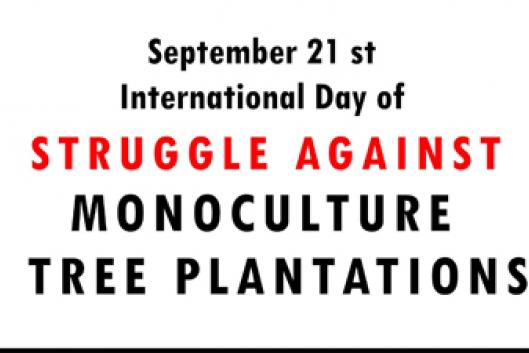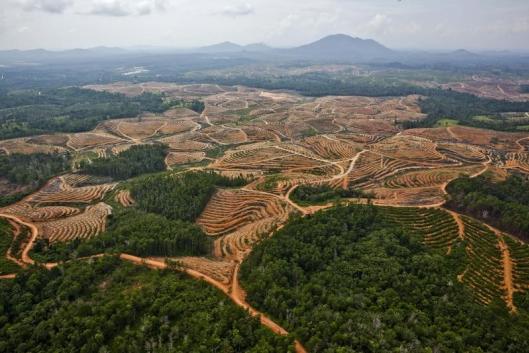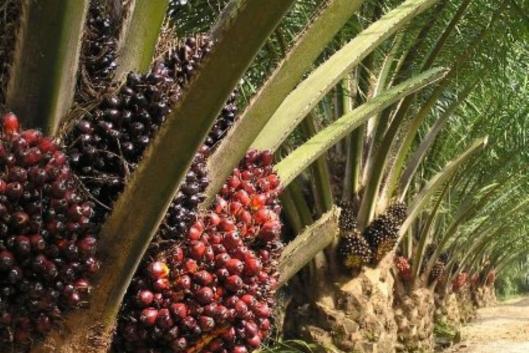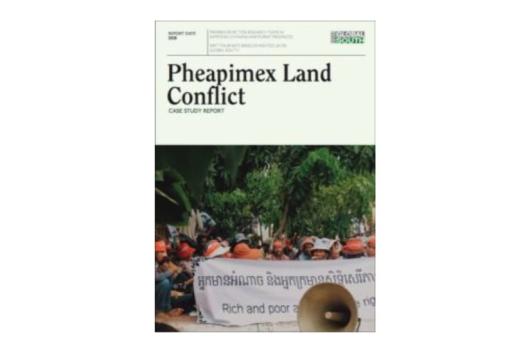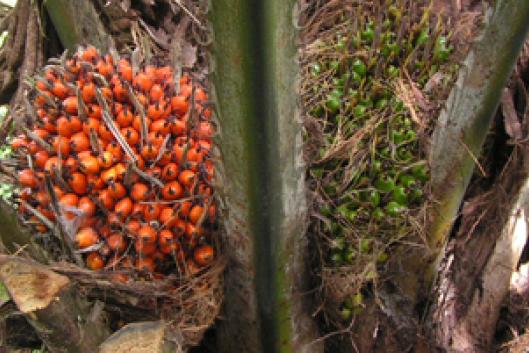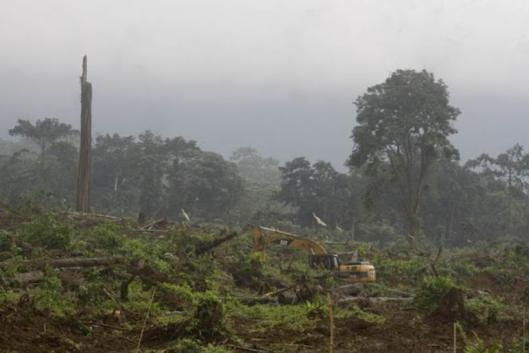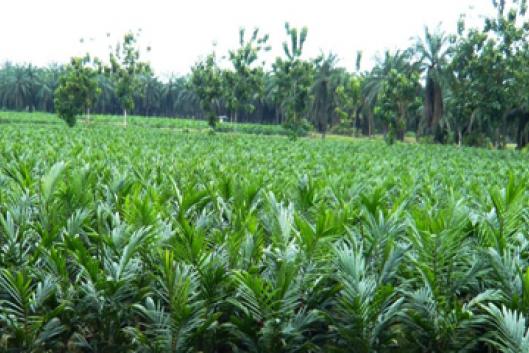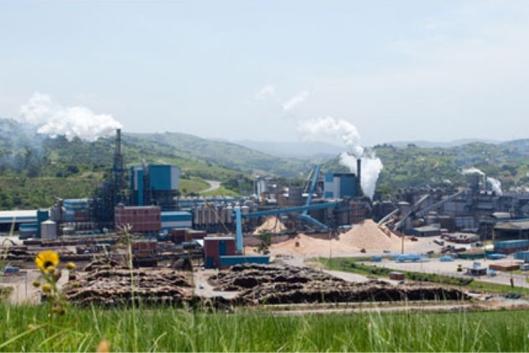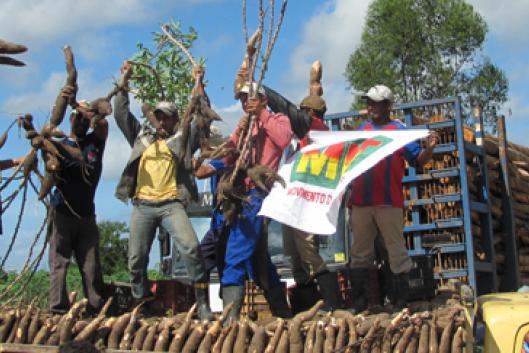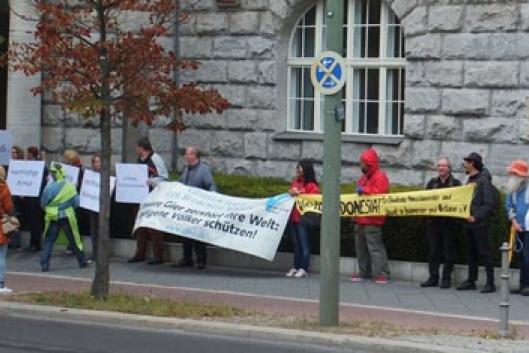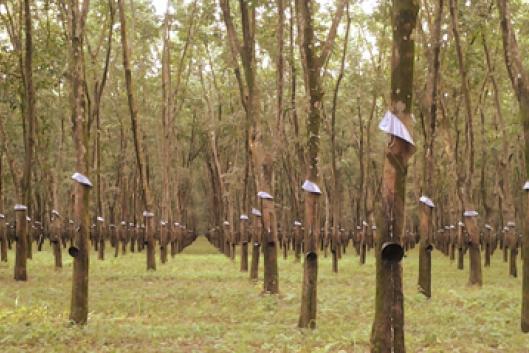What is the sense of another International Day of Struggle Against Monoculture Tree Plantations, which will take place this coming September 21? Some might ask why such a day is celebrated, since these plantations continue to grow and expand around the world. Is there really any way to stop the expansion of industrial plantations of oil palm, pine, acacia, eucalyptus and rubber trees?
Bulletin Issue 193 – August 2013
International Day of Struggle against Monoculture Tree Plantations
Download the here the full bulletin as pdf
Also available (in the oldsite) in French and Portuguese
WRM Bulletin
193
August 2013
OUR VIEWPOINT
TOWARDS SEPTEMBER 21, THE INTERNATIONAL DAY OF STRUGGLE AGAINST MONOCULTURE TREE PLANTATIONS: SEEDS OF RESISTANCE
-
11 September 2013Here in Indonesia, ever since a child entered the school, he/she has been familiar with “Merauke” through a patriotic song entitled “Dari Sabang Sampai Merauke” (lit. from Sabang to Merauke – from the westernmost to the easternmost part of Indonesia). The song talks about the unity and glory of Indonesia across its large and small islands reaching from Sabang, the westernmost part, to Merauke, the easternmost.
-
11 September 2013Few places in Southeast Asia can match the distinction of Palawan, in the Philippines. This is home to seven protected areas, a declared “Game Refuge and Bird Sanctuary” since 1967 and a “Mangrove Reserve” since 1981. UNESCO declared the whole Province a ‘Man and Biosphere Reserve’ in 1990.
-
11 September 2013The company promised to increase forest cover but they planted cassava; cassava is not a tree; a cassava plantation is not a forest. (Resident from Ansar Chambor, Pursat, Cambodia)
-
11 September 2013Over the past nine months, a high-stakes confrontation has taken place in Cross River State of Nigeria, home to Nigeria’s last remaining primal tropical rainforests. The controversy has revolved around the activities of Wilmar International, a Singaporean multinational which describes itself as “the world’s largest processor and merchandiser of palm and lauric oils’’. The company has been taken to task by a Calabar-based NGO, the Rainforest Resource and Development Centre (RRDC), for what the latter says are blatant violations of human and environmental rights as well as local and national laws.
-
11 September 2013In one of his last works – “Oil palm in Africa: Past, present and future scenarios”, published in December 2010 – our beloved friend and colleague Ricardo Carrere provided an overview of the history and current status of monoculture oil palm plantations in Africa (see http://wrm.org.uy/oldsite/countries/Africa/Oil_Palm_in_Africa.pdf).
-
-
11 September 2013During the Apartheid era many South Africans were deprived of their traditional land through laws that led to their displacement – often through forced removals - into remote smaller areas with marginal agricultural potential. At the same time, the South African government of the day was busy converting land taken from rural communities to establish vast monoculture plantations of alien trees, with the intention of supporting a pulp and paper industry that would help to reduce dependence on imported products, as well as reduce exposure to trade sanctions.
-
11 September 2013The Brazilian countryside, since the time of colonization, has always been the target of capitalist appropriation, driven by the logic of the accumulation of wealth and profits, with the Brazilian state mediating the maintenance of the capitalist world order. This logic, supported by technical assistance and bank credit agencies or by the active participation of multinational corporations, is manifested in the appropriation of nature and its transformation into merchandise, leading to growing concentration of control over rural areas, above all.
-
11 September 2013Millions of hectares of industrial oil palm plantations have been expanding in many countries of Asia, Africa and Latin America with a well documented history of tropical deforestation –including enormous fires- and a sad toll of human rights violations. However, the powerful interests behind this business continue actively promoting this crop, against a background of growing opposition at the local level.
-
11 September 2013The government of the state of Rio de Janeiro has adopted various initiatives since 2001 to promote the expansion of large-scale monoculture tree plantations in the state. It would seem that its intention is to recreate in Rio de Janeiro the green deserts that are laying waste to the north of the state of Espírito Santo, the extreme south of the state of Bahia, the north of Minas Gerais, the states of São Paulo and Paraná, the south of Rio Grande do Sul, and more recently, different parts of the states of Maranhão, Piauí and Mato Grosso do Sul.
-
11 September 2013Hevea brasilensis, known as the Pará rubber tree or, most commonly, the rubber tree, is native to South America. It is the member of the genus Hevea most frequently exploited industrially, as the milky latex extracted from the tree is the primary source of natural rubber.
RECOMMENDED
-
11 September 2013“Who is benefitting ? The Social and economic impact of three large scale land investments in Sierra Leone: a cost benefit analysis”, a report commissioned by Action for Large-scale Land Acquisition Transparency (ALLAT) with support from Christian Aid (UK), Interchurch Organization for Development Cooperation (ICCO, The Netherlands), the Catholic Organisation for Relief and Development AID (Cordaid, The Netherlands) and Bread for All (Development Service of the Protestant Churches in Switzerland), July 2013, http://www.christianaid.org.uk/images/who-is-benefitting-Sierra-Leone-report.pdf
-
11 September 2013Solo disponible en inglés - Agribusiness large-scale land acquisitions and human rights in Southeast Asia - Updates from Indonesia, Thailand, Philippines, Malaysia, Cambodia, Timor-Leste and Burma Forest Peoples Programme, August 2013 By Marcus Colchester, Sophie Chao, Jonas Dalliner, Su Mei Toh, Chan Kiev, Indriaswati Saptaningrum, Mark Anthony Ramirez and Juan Pulhin Ed: Sophie Chao, Forest Peoples Programme
-
11 September 2013"Expansion of palm oil in the Brazilian Amazon: an analysis of impacts on family farm in north-eastern Pará" Reporter Brazil – Organization for Communication and Social Projects’s Biofuel Watch Center Download here: http://reporterbrasil.org.br/documentos/pamoil.pdf
-
11 September 2013Agribusiness large-scale land acquisitions and human rights in Southeast Asia - Updates from Indonesia, Thailand, Philippines, Malaysia, Cambodia, Timor-Leste and Burma Forest Peoples Programme, August 2013 By Marcus Colchester, Sophie Chao, Jonas Dalliner, Su Mei Toh, Chan Kiev, Indriaswati Saptaningrum, Mark Anthony Ramirez and Juan Pulhin Ed: Sophie Chao, Forest Peoples Programme
